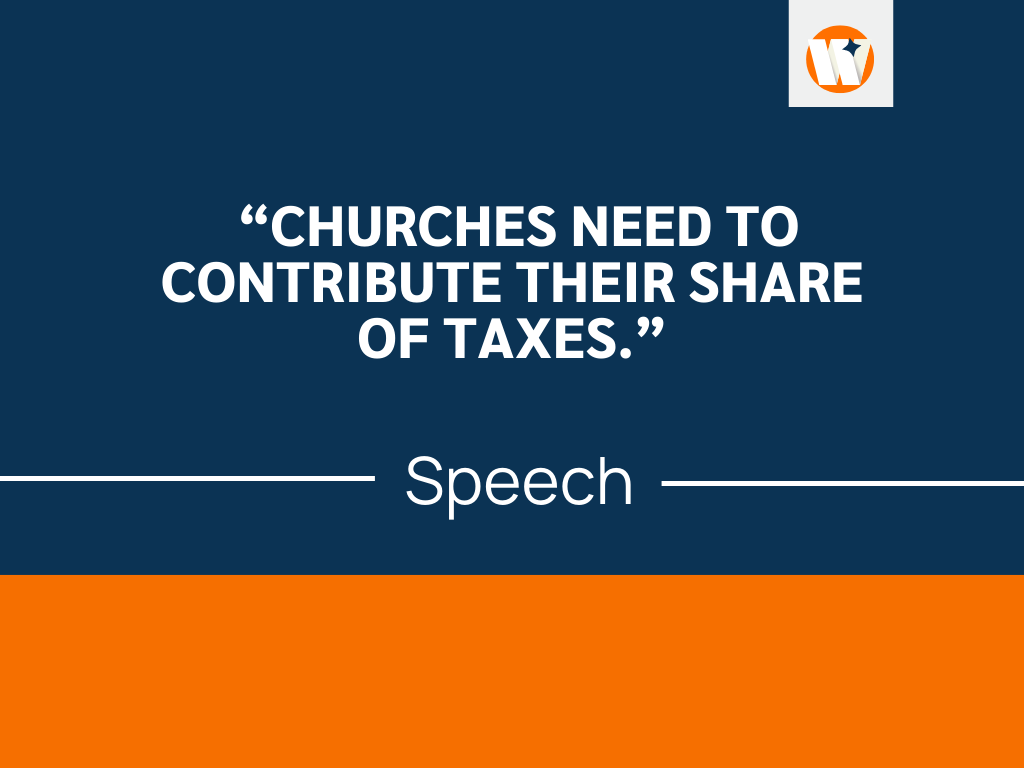Ghana needs to tax the church for development

Ghana is a developing country with a large number of churches that have been classified as either orthodox, charismatic, or one-man churches.
In a world where money is power, any organization that makes that much profit – whether it’s a church or not – needs to be held accountable somehow for the funds they receive and be made to pay taxes on some percentage of their incomes if not all.
However, the absence of public verifiable data and the current state of the law on taxing churches poses the question – What is the church hiding and why have they not suggested to the government to be taxed? And at what point are world governments going to start holding them to account as they do with every other massive institution?
While churches play an important role in providing social services, they are not currently taxed in Ghana which implies that the law may one day bring churches on board to pay tax on their huge incomes from offerings, and gifts among others.
This means currently, churches are not contributing to the development of Ghana in the same way that businesses and individuals do. Churches in Ghana make a lot of money from their various routine church services and special celebrations and if they pay tax on this, it will not be wrong.
Churches receive all manner of gifts yet they do not declare these gifts for tax purposes. For instance, a gift in Ghana is taxed at a rate of just 15% of a value in excess of Fifty Ghana Cedis (GH ¢50). The value of the taxable gift is the market value of the gift at the time of receipt. Taxable gift refers to the amount/value left after deducting the (GH ¢50) from the Gift Value. It is payable by the recipient of the gift. Where the government decided not to impose tax burdens on churches, it will still be prudent and religiously sincere for churches to pay gift taxes on all gifts they receive that meet the gift tax threshold.
But, it is important that as a nation we start thinking about how to tax churches if we have been able to introduce taxes on lotto and bet wins. One would have expected that churches would gladly call on the government to tax them as part of their direct contribution to funding national projects.
Taxing churches in Ghana is now due and the early the government starts legislative processes to tax them the better.
Taxing churches would generate revenue that could be used to fund development projects, such as education, healthcare, and infrastructure. It would also help to reduce inequality and ensure that everyone contributes to the development of Ghana.
The Bible quotation in which Jesus said, “Give unto Caesar what is Caesar’s, and give unto God what is God’s” is found in the Gospel of Matthew, chapter 22, verses 15-22.
In this passage, Jesus is being questioned by the Pharisees, who are trying to trap him in a political statement. They ask him, “Is it lawful to pay taxes to Caesar, or not?”
Jesus knows that the Pharisees are trying to trick him, so he answers them with a question of his own. He asks them, “Whose image is on the coin?”
The Pharisees answer, “Caesar’s.”
Jesus then says, “Render therefore unto Caesar the things that are Caesar’s and unto God the things that are God’s.”
This statement has been interpreted in many different ways over the centuries. Some people believe that it means that we should obey the laws of the land, while others believe that it means that we should give our ultimate allegiance to God.
Ultimately, the meaning of this statement is up to each individual to decide. However, it is a powerful reminder that we have a dual citizenship, one in this world and one in the Kingdom of God. We are called to live in both worlds, but we must always remember that our ultimate allegiance is to God.
Here is the full passage from the Bible:
Matthew 22:15-22
Then the Pharisees went out and laid plans to trap him in his words. They sent their disciples to him along with the Herodians. “Teacher,” they said, “we know that you are a man of integrity and that you teach the way of God in accordance with the truth. You aren’t swayed by others, because you pay no attention to who they are. Tell us then, what is your opinion? Is it right to pay taxes to Caesar or not?”
Jesus saw through their duplicity and said, “Why are you trying to trap me? Bring me a coin and let me look at it.” They brought the coin, and he asked them, “Whose image is this? And whose inscription?”
“Caesar’s,” they replied.
Then he said to them, “Give back to Caesar what is Caesar’s and to God what is God’s.”
When they heard this, they were amazed. So they left him and went away.
One can say without doubt that, the reply by Jesus that “So give back to Caesar what is Caesar’s, and to God what is God’s.” is valid today in Ghana as the country goes through hard times. It is time Caesar (Ghana) takes what belongs to it and a 10% tax on weekly offerings from churches will do the country a lot of God. If nothing at all, this can be used to take care of the physical challenges and the aged through a fund.
There are a number of potential benefits to taxing churches in Ghana.
Ghana needs to tax the church for development for the following reasons
- Generating revenue for development. Taxing churches would generate revenue that could be used to fund development projects, such as education, healthcare, and infrastructure. This would help to improve the lives of all Ghanaians, regardless of their religious beliefs.
- Reducing inequality. Churches are often seen as being wealthy institutions, and taxing them could help to reduce inequality in Ghana. This is because the revenue generated from church taxes could be used to fund programs that benefit the poor and marginalized.
- Ensuring fairness. Currently, businesses and individuals are taxed in Ghana, but churches are not. This is seen by some as unfair, as churches also benefit from the infrastructure and services provided by the government. Taxing churches would help to ensure that everyone contributes to the development of Ghana.
- Promoting transparency and accountability. Taxing churches would require them to be more transparent about their finances. This would help to ensure that they are using their resources for charitable purposes and not for personal gain.
Of course, there are also some potential drawbacks to taxing churches. These include:
- Loss of religious freedom. Some people argue that taxing churches would violate their religious freedom. However, it is important to note that churches are already subject to a number of other laws and regulations, such as zoning laws and building codes. Taxing churches would simply be another way of regulating them.
- Discouragement of charitable giving. Some people worry that taxing churches would discourage people from giving to charity. However, there is no evidence to suggest that this would happen. In fact, many people who donate to churches would likely continue to do so even if they were taxed.
- Administrative challenges. Taxing churches would be a complex and challenging task. The government would need to develop a system for determining the value of church property and income, and for collecting taxes from churches. This could be a costly and time-consuming process.
Ultimately, the decision of whether or not to tax churches is a complex one. There are both potential benefits and drawbacks to consider. It is important to weigh these carefully before making a decision.
READ: The Top 5 Largest Church Buildings in Europe
There are many countries where churches are taxed. Here are some examples:
- Austria: Churches are taxed on their income, property, and investments.
- Belgium: Churches are taxed on their income and property.
- Denmark: Churches are taxed on their income and property.
- Finland: Churches are taxed on their income and property.
- France: Churches are taxed on their income and property.
- Germany: Churches are taxed on their income and property.
- Greece: Churches are taxed on their income and property.
- Ireland: Churches are taxed on their income and property.
- Italy: Churches are taxed on their income and property.
- Netherlands: Churches are taxed on their income and property.
- Norway: Churches are taxed on their income and property.
- Spain: Churches are taxed on their income and property.
- Sweden: Churches are taxed on their income and property.
- United Kingdom: Churches are taxed on their income and property.
In some countries, there are exemptions for churches that are used for charitable purposes. For example, in the United States, churches are exempt from federal income tax, but they are subject to state and local taxes.
The reasons for taxing churches vary from country to country. In some countries, it is seen as a way to ensure that churches contribute to the public good. In other countries, it is seen as a way to prevent churches from becoming too powerful.
There are also a number of arguments against taxing churches. Some people argue that it violates their religious freedom. Others argue that it would discourage people from giving to charity. Still, others argue that it would be difficult to administer and enforce.
Ultimately, the decision of whether or not to tax churches is a complex one. There are both potential benefits and drawbacks to consider. It is important to weigh these carefully before making a decision.
Send Stories | Social Media | Disclaimer
Send Stories and Articles for publication to [email protected]
We Are Active On Social Media
WhatsApp Channel: JOIN HERE
2024 BECE and WASSCE Channel - JOIN HERE
Facebook: JOIN HERE
Telegram: JOIN HERE
Twitter: FOLLOW US HERE
Instagram: FOLLOW US HERE
Disclaimer:
The information contained in this post on Ghana Education News is for general information purposes only. While we endeavour to keep the information up to date and correct, we make no representations or warranties of any kind, express or implied, about the completeness, accuracy, reliability, suitability or availability with respect to the website or the information, products, services, or related graphics contained on the post for any purpose.



 Profile Of Kwabena Boateng, Ejisu MP Elect
Profile Of Kwabena Boateng, Ejisu MP Elect  KNUST student honoured at International Sports Media Awards (AIPS)
KNUST student honoured at International Sports Media Awards (AIPS)  GNAPS calls for urgent subsidy of BECE charges for private schools
GNAPS calls for urgent subsidy of BECE charges for private schools  GES To Query 42 Teachers In The Upper West Region; Here’s Why
GES To Query 42 Teachers In The Upper West Region; Here’s Why  Ministry of Education Denies Rebranding of Basic Schools
Ministry of Education Denies Rebranding of Basic Schools  GNPC Opens 2024 Scholarships Portal For New Applicants
GNPC Opens 2024 Scholarships Portal For New Applicants